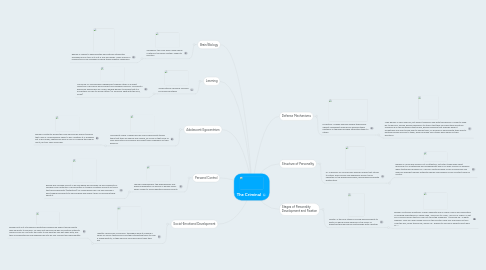
1. Adolescent Egocentrism
1.1. Invincibility Fable: a belief held by many adolescents telling them that they are special and unique, so much so that none of life's difficulties or problems will affect them regardless of their behavior
1.1.1. Bender constantly breaks the rules because he doesn't believe that rules or consequences apply to him. Whether it is sneaking pot in his locker, lighting his shoe on fire or crawling through air ducts, he truly feels invincible.
2. Personal Control
2.1. Learned Helplessness: the hopelessness and passive resignation an animal or human learns when unable to avoid repeated aversive events
2.1.1. Bender has reached a point in his life where he has given up any possibility of freedom from detention. He has gotten in trouble countess amounts of times that his punishments (detentions) no longer phase him. He has reached a point where he expects to be punished and doesn't plan on doing anything about it.
3. Social-Emotional Development
3.1. Identity versus Role Confusion: teenagers work at refining a sense of self by testing roles and then integrating them to form a single identity, or they become confused about who they are
3.1.1. Bender puts out a tough guy reputation because he doesn't know exactly who he wants to become. He feels lost because he has no positive authority figures in his life. He tests the limits to see what he can get away with, and then incorporates his new experiences into his self concept and new identity.
4. Learning
4.1. Observational Learning: learning by observing others
4.1.1. The soure of John Bender's aggression towards others is a direct reflection of his home environment and childhood lessons. His parents physically abused him as a child, leading Bender to believe that it is acceptable for him to abuse others. (ie: Picking a fight with the jock, Andy)
5. Brain/Biology
5.1. Amygdala: two-lima-bean-sized neural clusters in the limbic system; linked to emotion
5.1.1. Bender is unable to appropriately deal with his stimulated amygdala and in turn acts out in fear and anger. There may be a malfunction in his amygdala causing these negative responses.
6. Defense Mechanisms
6.1. Projection: is when humans defend themselves against unpleasant impulses by denying there existence in themselves while attributing them to others
6.1.1. John Bender is very insecure, yet doesn't properly deal with this feeling. In order to keep his 'tough guy' facade, Bender expresses to others that they are essentially immature. Growing up in the household that he did, Bender believed that feelings weren't acceptable and didn't know how to handle them, so his way of dealing with them was to pretend he was immune to them, while he made sure others were aware of their emotions.
7. Structure of Personality
7.1. ID: a reservoir of unconscious psychic energy that strives to satisfy basic sexual and aggressive drives. the id operates on the pleasure principle, demanding immediate gratification
7.1.1. Bender is a man who needs a lot of attention, yet often times goes about receiving it in unobtainable and inappropriate ways. He feels a sense of purpose when testing and pushing Mr. Vernon's limits because of his unconscious and insecure feelings towards authority figures and because of his constant need for control.
8. Stages of Personality Development and Fixation
8.1. Genital: is the final stage occurring during puberty to death, in which sexual behavior is the focus of pleasures through sexual relationships with a partner
8.1.1. Bender continually questions Claire's sexuality and is overly curious and fascinated in knowing everything.In a verbal rage, John yells to Claire, "Are you a virgin? I'll bet you a million dollars that you are! Let's end the suspense! It's gonna be... a white weddin? Have you ever kissed a boy on the mouth? Have you ever been felt up? Over the bra, under the blouse, shoes off... hoping to God your parents don't walk in...."
